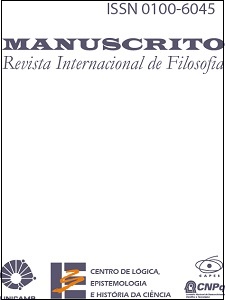Abstract
This paper aims at construing the notions of motion, behavior and action in connection with each other. First, it is argued that motion is an event lawfully described by means of some mechanical theory, and its concepts and models. Likewise, behavior is the kind of human (or animal) event functionally described by means of probabilistic models that connect what different individuals do in circumstances where a mechanical description is not relevantly explicative. Viewed this way, behavior is an essentially social phenomenon. Finally, action is the kind of human occurrence that cannot be lawfully explained. The concept of action thus argued for is fundamentally residual in relation to the concepts of behavior and motion.
References
DAVIDSON, D. Essays on Actions and Events. Oxford: Oxford University Press, 1980.
DENNETT, D. Brainstorms. Philosophical Esssays on Mind and Psychology. Cambridge, Mass.: The MIT Press, 1978.
DENNETT, D. The Intentional Stance. Cambridge, Mass.: The MIT Press, 1987.
DUTRA, L.H. de A. “Réalisme et Fictionalisme chez Claude Bernard.” Dialogue, XXXVIII, pp. 719-742, 1999.
DUTRA, L.H. de A. “Quine on the Nature of Mind: From Behaviorism to Anomalous Monism.” In: L.H. de A. Dutra, e C.A. Mortari, (orgs.). Princípios. Seu Papel na Filosofia e nas Ciências. Florianópolis: NEL, 2000.
DUTRA, L.H. de A. “Mental Events and Properties.” In: A.O. Cupani, C.A. Mortari, (orgs.). Linguagem e Filosofia. Anais do Segundo Simpósio Internacional Principia. Florianópolis: NEL, 2001.
DUTRA, L.H. de A. “Propositional Attitudes, Intentionality and Lawful Behaviors.” Principia 7(1-2): 93-114, 2003.
DUTRA, L.H. de A. “How Serious is Our Ontological Commitment to Events as Invidivuals?” Principia 9(1-2): 43-71, 2005.
EDDINGTON, A.S. [1928]. The Nature of the Physical World. New York: The Macmillan Co., 1948.
GARDNER, H. The Mind’s New Science. New York: Basic Books, 1985. JAMES, W. Essays in Radical Empiricism. Boston: Longmans, Green & Co., 1912.
PINKER, S. How the Mind Works. New York/London: W. W. Norton & Co., 1997.
QUINE, W. v. O. 1953. “On What There Is.” From a Logical Point of View. Cambridge, Mass.: Harvard University Press.
QUINE, W. v. O. Word and Object. Cambridge, Mass.: The MIT Press, 1960.
QUINE, W. v. O. Ontological Relativity and Other Essays. New York/London: Columbia University Press, 1969.
QUINE, W. v. O. The Roots of Reference. La Salle, Ill.: Open Court, 1974.
QUINE, W. v. O. Ways of Paradox and Other Essays. Cambridge, Mass./London: Harvard University Press, 1976.
RACHLIN, H. Judgment, Decision, and Choice. A Cognitive/Behavioral Synthesis. New York: W. H. Freeman & Co., 1989.
RACHLIN, H. Behavior and Mind. The Roots of Modern Psychology. New York/Oxford: Oxford University Press, 1994.
RUSSELL, B. [1921]. The Analysis of Mind. London: Routledge, 1997.
SKINNER, B.F. [1953]. Science and Human Behavior. New York: Macmillan, 1965.
SKINNER, B.F. Contingencies of Reinforcement: A Theoretical Analysis. New Jersey: Prentice-Hall, 1969.
SKINNER, B.F. [1974]. About Behaviorism. New York: Vintage, 1976.

